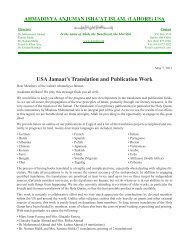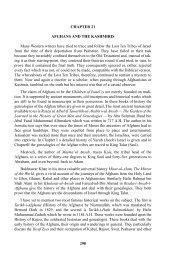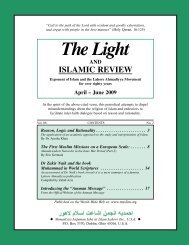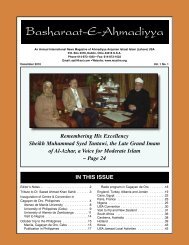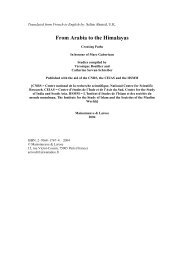Part 2] HARD TRIALS NECESSARY TO ESTABLISH TRUTH 69 152 ...
Part 2] HARD TRIALS NECESSARY TO ESTABLISH TRUTH 69 152 ...
Part 2] HARD TRIALS NECESSARY TO ESTABLISH TRUTH 69 152 ...
Create successful ePaper yourself
Turn your PDF publications into a flip-book with our unique Google optimized e-Paper software.
82 Ch. 2: THE COW [Al-Baqarah<br />
187 It is made lawful for you to go<br />
in to your wives on the night of the<br />
fast. They are an apparel for you and<br />
you are an apparel for them. a Allåh<br />
knows that you acted unjustly to<br />
yourselves, so He turned to you in<br />
mercy and removed (the burden)<br />
from you. b So now be in contact with<br />
fasting is a spiritual exercise and it brings about spiritual awakening in man. A man is<br />
required to abstain from satisfying the natural desires of hunger and thirst and to suffer certain<br />
privations, not because there is any harm or any moral delinquency in doing so, but<br />
simply because he believes that it is the commandment of God that he should abstain. As<br />
the Prophet said: “He gives up his food and his drink and his sexual desire for My sake:<br />
Fasting is for Me” (B. 30:2). This undoubtedly awakens a living consciousness of the<br />
existence of God in the mind. This is the idea underlying the words: My servants ask thee<br />
concerning Me. A real and earnest search for God is raised in the mind through fasting.<br />
I am near is the reply to that inner search. And then follow the words: I answer the<br />
prayer of the suppliant when he calls on Me. God is near, but that consciousness only<br />
raises the further desire to get nearer and nearer to Him. For that man calls on God; he<br />
prays to Him to draw him closer and closer to Himself. And he is told that God accepts<br />
this prayer. The sincere yearning of the soul of a man to get nearer and nearer to God is<br />
always accepted. But this yearning and this prayer, the verse goes on to say, must be<br />
implemented by acts of obedience: So they should hear My call. Prayer to draw closer to<br />
God is therefore accepted when the earnestness of the soul’s yearning is shown by acts<br />
of sacrifice in the way of God.<br />
It should be borne in mind that the acceptance spoken of here is primarily in relation<br />
to prayers for the attainment of the nearness of God. As regards the acceptance of<br />
prayers generally, prayers for deliverance from distress and affliction and prayers for the<br />
attainment of certain temporal benefits, we are told elsewhere: “Him you call upon, so<br />
He removes that for which you pray, if He pleases” (6:41). He accepts such prayers or<br />
does not accept them as He pleases. And while God accepts sometimes the prayers even<br />
of the unbelievers and the transgressors (10:22, 23; 17:67), and much more frequently of<br />
His faithful and righteous servants, He tries even the latter by making them suffer<br />
hardships; “And We shall certainly try you with something of fear and hunger and loss<br />
of property and lives and fruits” (v. 155). Thus while God’s dealing with even the<br />
transgressors is merciful, so that He sometimes accepts their prayers, His dealing with<br />
the faithful who call on Him and pray to Him is that of a friend — listening to their<br />
prayers or requiring them to submit to His will as He pleases.<br />
187a. The mutual relations of husband and wife are here described in words which<br />
could not be surpassed in beauty. In the first place, the sex instinct, a desire for the<br />
opposite sex, is classed with hunger and thirst. It is a natural desire and man could not<br />
live without satisfying it as he could not live without satisfying hunger and thirst. And<br />
then in these words — your wives are an apparel for you and you are an apparel for<br />
them — we are told that while satisfying a natural desire, the relation of husband and<br />
wife has higher ends in view. They serve as a garment for each other, i.e., they are a<br />
means of protection, comfort and even embellishment for each other, and the weakness<br />
of one is made up by the strength of the other.<br />
187b. Takhtån∂n, or you acted unjustly to yourselves, is in reference to the injury<br />
which they caused to themselves by unnecessarily resisting the sexual craving or hunger


![Part 2] HARD TRIALS NECESSARY TO ESTABLISH TRUTH 69 152 ...](https://img.yumpu.com/11777151/14/500x640/part-2-hard-trials-necessary-to-establish-truth-69-152-.jpg)

